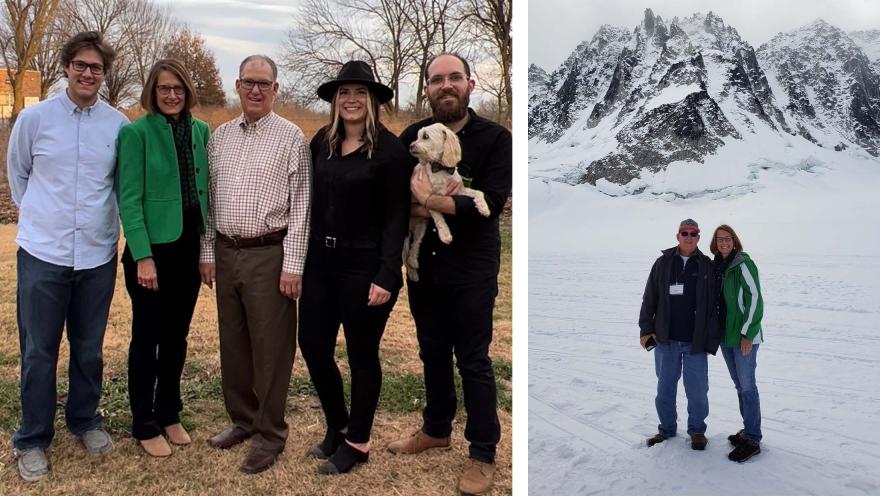This publication is the fourth in a four-part series shining a spotlight on ALS multidisciplinary care.
While each person diagnosed with ALS and their family will experience their own unique journey with the disease, ALS multidisciplinary clinics around the country consistently play a critical role in ensuring they receive the care they need to extend their survival and have the best quality of life possible.
We recently spoke with Joan and Tony Nolting about their personal experience living with ALS and attending an ALS Association Certified Center of Excellence. After experiencing mild breathing symptoms and slurred speech, Tony was diagnosed with bulbar onset ALS in September of 2020, just five days after his 63rd birthday.
Can you tell us about the care you receive from your ALS multidisciplinary clinic?
We attend the multidisciplinary clinic at the University of Kansas. It is comprised of a team of experts that always has the time to answer questions and is eager to provide practical suggestions and solutions. The experts at the clinic discuss Tony’s situation among each other prior to each of his clinic visits as well as during his visit. The team anticipates issues, such as the need for a feeding tube, and explains options along with the pros and cons. Their approach is positive and caring, and their experience is extensive. The team is quick to provide information about where to find products and resources that help manage symptoms and/or improve his quality of life.
From your perspective as attendees, what do you think the benefits are of multidisciplinary care for people living with ALS and their caregivers and families?
We find that multidisciplinary care is an efficient way to visit experts from a variety of disciplines and obtain answers to our questions. The coordinated team approach allows us to spend time with each expert in one location on one day. We don’t always know which expert to ask a specific question, and the coordinated approach ensures that we leave with all our questions answered. Additionally, as questions arise between clinic visits, we contact the KU ALS nurse, and she sends the questions to the appropriate team member who will respond to us directly.
From your experience, can you describe what a typical day at the clinic looks like for you and your husband?
When we arrive at the clinic, we are assigned an evaluation room, in which we stay throughout the day. We are asked which of the discipline experts that we’d like to have an evaluation from or conversation with that day. It’s perfectly acceptable to request a visit with all the experts, and that’s what we generally do. One by one, the experts visit the room, evaluate Tony, and answer our questions. Sometimes, two experts with complementary disciplines visit together, such as the speech pathologist and the dietician. The visit often takes around four hours. While it can be an exhausting day, we leave with the information and knowledge needed to continue the ALS fight. And we appreciate that we did not have to make separate appointments and travel to multiple locations to visit the experts.
Are you registered with an ALS Association local chapter? If so, is there anything you’d like to share about them and how it is they support you and your family?
We work with The ALS Association Mid-America Chapter. Simply put, it’s an amazing organization. We have a care services team member assigned to us who is compassionate, caring, knowledgeable, encouraging, and helpful. She listens to our situation and suggests and provides resources that help improve Tony’s quality of life. She also leads a monthly support group for ALS patients, and one of her colleagues leads a monthly support group for caregivers. Both do a wonderful job of acknowledging the challenges of the disease and providing resources and support.
For people who may be introduced to ALS for the first time, what would you want them to know about what it’s like to live with ALS?
An ALS diagnosis is terrifying. There is no playbook as the disease progresses differently in each patient. But it’s possible to have a good quality of life with some adaptations. Take advantage of the resources available to you at a multidisciplinary clinic, The ALS Association, and other support organizations, such as your church. Do not let ALS control your life; instead, be determined to make the best of a difficult situation. Spend time with family and friends; allow them to help. And start doing some of the items on your bucket list!
Special thanks to Joan and Tony and the team at The ALS Association’s Mid-America Chapter for allowing us to share their unique perspective about multidisciplinary ALS.
To learn more about multidisciplinary ALS care and The Association’s Certified Treatment Centers of Excellence and Recognized Treatment Centers Program, visit our website HERE. To continue to learn more about the disease and follow stories about people living with ALS in the community, follow our blog at als.org/blog.


Join the conversation. Please comment below.